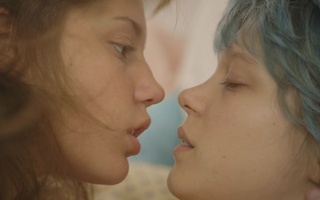The Tunisian-born French film director Abdellatif Kechiche received the 2010 Genevieve McMillan Award at the Harvard Film Archive last Friday. “I am moved and touched [and] all the more gratified to receive this prize at this particular time because I am in the final stages of my most recent film, which can be tiring, and [this] is a great motivator to go back into the editing room,” Kechiche said.
The Genevieve McMillan Award was first established in 1997 to support distinguished filmmakers of Francophone-African origin. Although he has spent most of his life in France, Kechiche, the eleventh recipient of the prize, was deemed to have excellently portrayed France’s Arab community through his films. To mark the occasion, the Harvard Film Archive presented a weekend-long retrospective of his three films, starting with 2004’s “Games of Love and Chance.”
At the time of its release, “Games of Love and Chance” was a triumphant critical success, winning four prizes—including Best Film, Best Director, Best Writing, and Most Promising Actress—at the César Awards in France. His subsequent movie, “The Secret of the Grain,” released in 2007, achieved even stronger critical acclaim. Along with the same four César prizes rewarded to “Games of Love and Chances,” it also received three others at the Venice Film Festival, including the Special Jury Prize.
Kechiche introduced “Games of Love and Chance” with a heartfelt tribute to its cast, which is almost solely comprised of teenagers. He said, “Now we are going to see an older film, the one that I made several years ago, made with limited means, very little money, but the one in which the energy of young people became its true motivating factor, my joy, and drove the production.”
“Games of Love and Chance” is about the teenage Abdelkrim, or Krimo, from the Paris suburbs who becomes infatuated with his gamine classmate Lydia. Krimo joins the school production of Marivaux’s “Games of Love and Chance” to play the counterpart of Lydia’s character. However, Krimo fails to go beyond merely murmuring the lines, since, as a matter of fact, he has never read a single book in his life not to mention 18th-century classical theatre. Kechiche’s camera observes the unfolding of the story with a heavy hue of endearment.
During the question and answer session that followed the screening, Kechiche seemed to continuously avoid an analytical approach to the film. “I did not explicitly set out to give the film a sociological label,” he said. “I primarily wanted to tell a story around the themes that were important to me—theatre, first love, the energy of youth.” Kechiche added that the specific social milieu was due to autobiographical reasons, and that any sociological or political nuances the film might deliver have been subconscious from his part.
Kechiche was more enthusiastic when discussing the purely aesthetic components of the film. For example, he gave a poetic explanation to his frequent use of close-ups, saying,
“In making the film, I found myself actually unable to move the camera backwards and open the frame. With each film I promised myself I will move it back, I will broaden the shot, but it has only gotten closer with each film.”
“It seems that there is something mysterious in the faces themselves. Something seems to appear in the faces—which I still do not understand—I dare to even call it Truth, and I find it better expressed in close-ups.”
Read more in Arts
WWII Film Offers POV on HolocaustRecommended Articles
-
Round II Contenders—'10 Class Marshal ElectionsYes, the Class of 2010 is one step closer to choosing which eight people will be charged with annoying them
-
 Realism and Awe in "Blue"
Realism and Awe in "Blue" -
Blue Is the Most Contentious ColorIronically, the urge to find a “lesbian” voice in the debate can lead to the marginalization of those who don’t fit normative images, leaving them outside whatever ends up being the community standard of legitimacy.
-
 Harvard Today: April 3, 2014
Harvard Today: April 3, 2014













